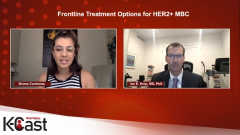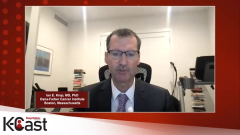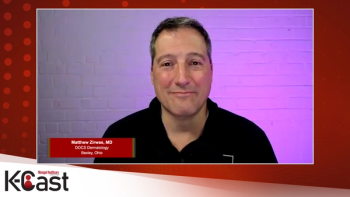
Frontline Treatment Standards for HER2+ mBC
Debra Patt, MD, PhD, MBA, describes the frontline standards of care and the factors involved in deciding on a treatment for human epidermal growth factor receptor 2-positive metastatic breast cancer.
Episodes in this series

Briana Contreras: Hello, everyone, and welcome to this Managed Healthcare Executive® program titled “Value-Based Decision-Making in Metastatic Breast Cancer.” My name is Briana Contreras, and I am an associate editor of Managed Healthcare Executive®. Joining me today is Dr. Debra Patt, executive vice president at Texas Oncology. Dr. Patt, in our first series of questions, we’ll be reviewing the standards of care for frontline treatment of metastatic HER2+ [human epidermal growth factor receptor 2 positive] breast cancer. For my first question, can you share what the historical frontline standards of care have been for HER2+ metastatic breast cancer?
Debra Patt, MD, PhD, MBA: That’s a great question, Briana. I think that there is a simple answer, and then there are multiple nuances to that simple answer. Most patients who have metastatic HER2 amplified breast cancer benefit frontline from a combination of chemotherapy with docetaxel in combination with HER2 targeted therapy like trastuzumab and pertuzumab. The easy answer is that this frontline strategy has been incredibly effective at maintaining disease control in this population of women. Many of them have benefited from having that strategy implemented, and it has controlled their disease for many years. The more complicated answer is that we always need to think about certain patient specific factors as we consider what treatment is right for which patient. When you look at patients with metastatic breast cancer in general, breast cancer only metastasizes to the brain an average of about 10% of the time. But in patients with metastatic breast cancer, brain metastases are much more common and can happen maybe as much as 50% of the time. If you have a patient that has brain metastases at the time of their presentation, then possibly giving them a more central nervous system-directed type of treatment makes a lot of sense. There are a couple of strategies which we implement that are more favorable for penetration of the central nervous system with the efficacy of disease control in the central nervous system, such as the HER2CLIMB data like tucatinib, trastuzumab in combination with capecitabine or with ado-trastuzumab. In addition, sometimes patients who have highly endocrine sensitive cancers may benefit from treatment with endocrine blockade in combination with HER2 blockade as an upfront treatment strategy. That may be a good answer for some patients. I will say even a consideration for some patients, which is not yet FDA [Food and Drug Administration] approved in this space, is the combination of endocrine therapy HER2 blockade and CDK 4/6 inhibition like in monoclonal [antibodies]. Those are reasonable considerations in this patient population.
Briana Contreras: Thank you. What is the current role of chemotherapy in the frontline management of metastatic breast cancer?
Debra Patt, MD, PhD, MBA: Generally speaking, HER2-directed therapy is more effective given in combination with chemotherapy. We favor giving the 2 in combination. I think for most breast medical oncologists, the frontline regimen which we tend to favor is docetaxel in combination with trastuzumab and pertuzumab. That’s a very effective frontline regimen of treatment.
Briana Contreras: Thank you. How do you decide which patients are appropriate for chemotherapy in this setting? What do the NCCN [National Comprehensive Cancer Network] guidelines recommend?
Debra Patt, MD, PhD, MBA: That’s a great question. Again, each patient has an individualized decision based on their age, their performance status, their comorbid illnesses, and their ability and desire to have certain treatment interventions. I think that guidelines put you down a certain path. Doctors make individualized treatments in the rooms of patients when they are able to make informed decisions. I think that’s always a complicated factor. For example, in a patient that is much older, has substantial comorbid illness, and has an ER+ [estrogen receptor-positive] and HER2 amplified cancer, I might favor giving that patient endocrine blockade in combination with HER2 blockade as opposed to chemotherapy in combination with HER2 blockade. I think that it would be more tolerable for the patient. Patient factors are always taken into account as we make these treatment decisions. In addition, as I already mentioned, brain metastases can influence your choice of upfront treatment strategies. All of those are important. NCCN guidelines recommend either chemotherapy combined with HER2 blockade or endocrine therapy combined with HER2 blockade as frontline treatment choices. Again, you can think of guidelines like a map that aspires to get you to a particular destination, but there may be patient-specific factors, like you would have route-specific factors along a map. As you go along that journey, they would cause detours or deviations from a guideline based on informed clinical decision-making.
Briana Contreras: Thank you. What are some of the challenges associated with available frontline therapies for providers and for patients?
Debra Patt, MD, PhD, MBA: Well, we all face challenges in the prior authorization environment that limit patient care. That is always the limitation, even for very straightforward, guideline-based treatment. Frequently, prior authorization management is a delay, and sometimes a detour, to patients getting the appropriate care that they need. That’s a challenge to manage. Then, in this era where we are burdened by a global pandemic, all of the workup patients need in the metastatic setting is a little delayed. It’s taking longer. There are capacity limitations with biopsies, additional imaging, and with staff that causes delays and appropriate care delivery. Things that used to happen more quickly now takes longer.
Transcript edited for clarity.
Newsletter
Get the latest industry news, event updates, and more from Managed healthcare Executive.


































